
Suddenly everyone’s talking about social cohesion.
In the US, Trump’s detractors say his presidency will undermine social cohesion. From immigration and abortion to tariffs and foreign policy, his policies divide the nation.
In New Zealand, there are fears that the ACT Party’s Treaty Principles Bill will damage social cohesion, and the country’s race relations in particular. Former Prime Minister Jenny Shipley has even described it (unwisely) as ‘inviting civil war’.
In Australia, two events over the last twelve months have challenged social cohesion. The first was the unsuccessful referendum to insert an Indigenous ‘Voice’ into the Australian constitution. Race and politics are a dangerous combination.
The second event was the Hamas attack on Israel and the ensuing war in Gaza and Lebanon. The presence of significant Jewish and Muslim communities in Australia has made the Middle East conflict a domestic Australian problem. Antisemitism and Islamophobia have risen sharply.
However, the release this month of the 2024 Mapping Social Cohesion Report suggests that the greatest threat to social cohesion in Australia is the economy. Or more specifically the cost-of-living and housing ‘crises’.
The report is produced by the Scanlon Foundation in conjunction with the Australian Multicultural Foundation and Australian National University. It is based on a survey in July and August of more than 8,000 respondents. They were asked a series of questions about attitudes towards, and perceptions of, a wide range of indicators of social cohesion, such as political participation, sense of belonging, trust in various institutions, and pride in the Australian way of life and culture.
The survey is especially useful because Scanlon has been measuring social cohesion in Australia for nearly twenty years.
The picture presented is a sobering one.
The Scanlon Index of Social Cohesion, 2007 to 2018 (telephone surveys) and 2018 to 2024 (online and telephone)
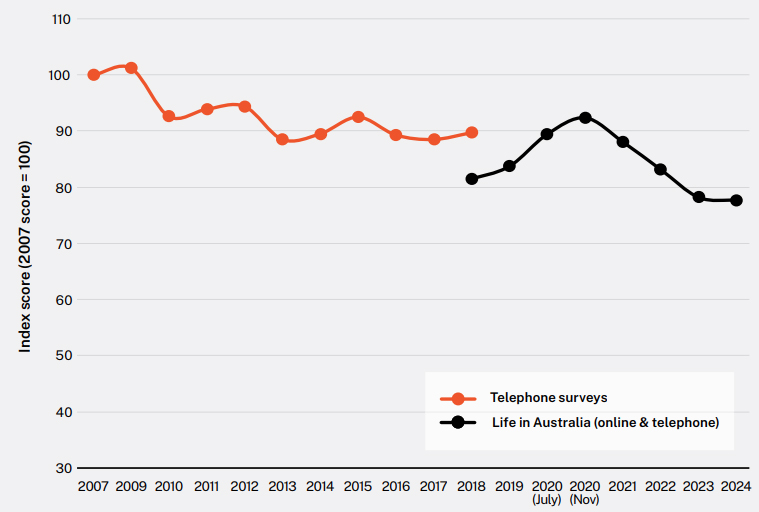
Source: Scanloninstitute.org.au
The data indicates a decline in social cohesion of 20% over the survey period, with the steepest drop occurring since 2020.
One of the key findings is the role that economic issues play in undermining social cohesion. Scanlan CEO Anthea Hancocks concludes that
… cost of living pressures continue to impact many in society, and these pressures have a negative impact on trust in government and institutions, one’s sense of worth and belonging, and our preparedness to participate in society’
People experiencing financial difficulties are also ‘more likely to have negative views on migrants and multiculturalism’.
Perhaps unsurprisingly, Australians retain a high degree of trust in community and public services but exhibit weaker trust in government and media. Declining trust in government, a worldwide phenomenon, does not augur well for the future of liberal democracy.
The impact of the cost-of-living crisis and the housing crisis is reflected in what Australians see as the country’s biggest problem.
The most important problem facing Australia and the world today, most commonly cited, Life in Australia, 2024
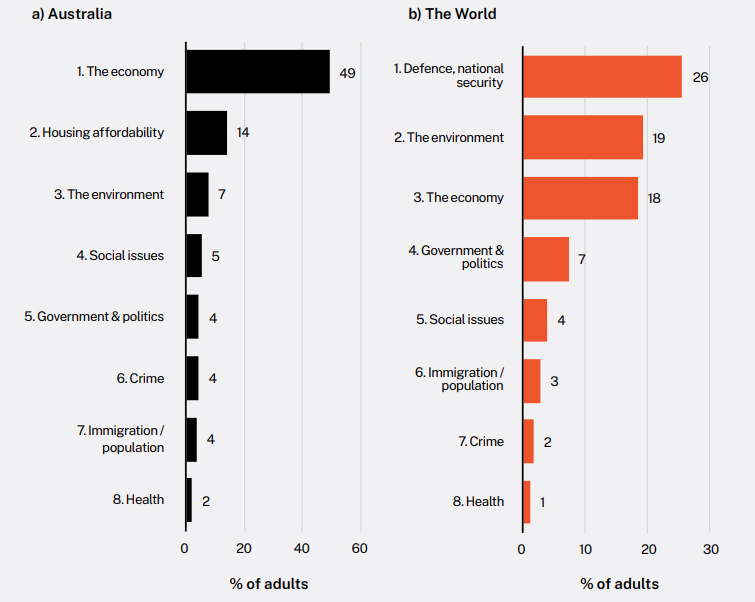
Source: Scanloninstitute.org.au
As one of Bill Clinton’s advisers famously said back in 1992, ‘it’s the economy stupid’. That’s not good news for the current Australian federal government which faces an election by May next year.
This month has also seen the release of the 2024 Australian Unity Wellbeing Index report. This is the result of research into wellbeing undertaken by Australian Unity and Deakin University. The Index has been produced for more than two decades.
Again, the trend is not encouraging.
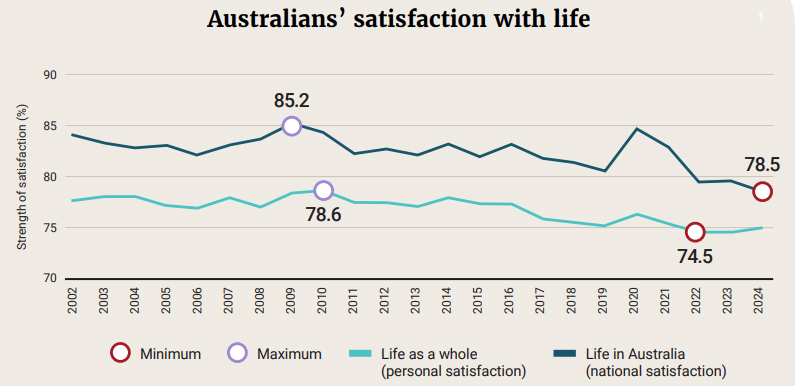
Source: Australianunity.com.au
As with social cohesion, wellbeing has declined steadily over the last twenty years. The similar trajectories are not surprising given that many of the factors that undermine social cohesion – financial hardship, a reduced sense of belonging, and the loss of trust in institutions – are relevant to a person’s sense of wellbeing.
The Australian Unity Wellbeing report has specific data on the link between personal wellbeing and two measures of a person’s financial position – home ownership and income.
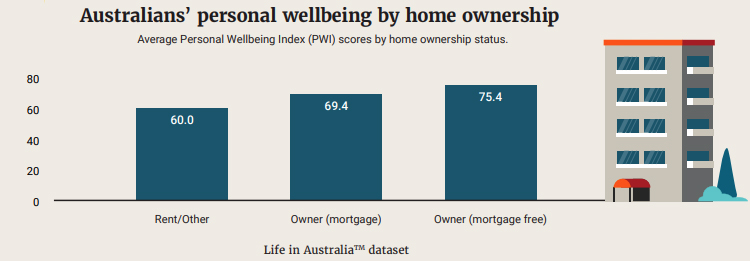
Source: Australianunity.com.au
Clearly, home ownership is a significant factor in personal wellbeing. Therefore, it’s a concern that (i) the rate of home ownership in Australia has declined over the last twenty years and (ii) the age at which Australians acquire their first home is rising steadily. That partly explains why Australians’ satisfaction with life is in decline.
This data points to an often-overlooked threat to social cohesion – the anger of younger Australians priced out of the housing market towards older Australians who are homeowners and have benefitted enormously from the rise in house prices over the last thirty to forty years.
If the Australian government wants to improve social cohesion and personal wellbeing, it needs to urgently address the current housing crisis. Unfortunately, doing so means grappling with a host of tricky political issues including immigration, tax policy, land zoning, ‘nimbyism’, inflation, and interest rates.
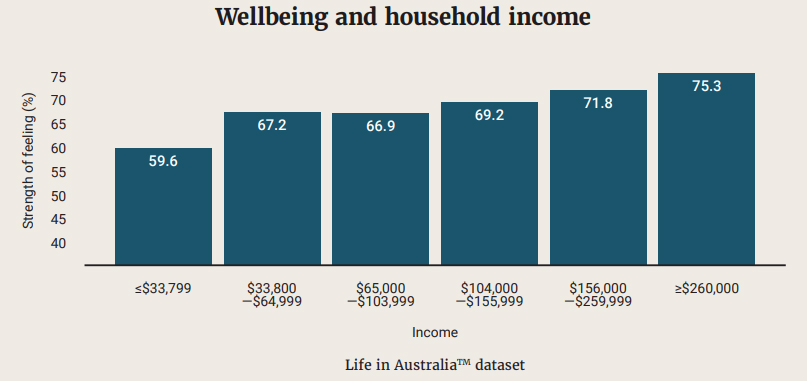
Source: Australianunity.com.au
There’s a strong positive correlation between higher incomes and personal wellbeing.
Who says money doesn’t buy you happiness.
Therefore, it’s a statement of the obvious but one way for the government to increase Australians’ wellbeing is to increase their incomes. There are several ways of doing that including increasing borrowing and/or taxes to fund higher welfare payments, but that just raises other difficulties.
The only sustainable long-term solution is to increase productivity. As economist Paul Krugman put it, ‘productivity isn’t everything, but in the long run, it’s almost everything’.
Achieving productivity gains in a mature economy like Australia is difficult. But given the resulting gains in wellbeing and social cohesion, it’s worth the effort.
*Ross Stitt is a freelance writer with a PhD in political science. He is a New Zealander based in Sydney. His articles are part of our 'Understanding Australia' series.
62 Comments
Increasing incomes is all very well.. But this just means increasing house prices and more inflation.. If everyone was earning a million dollars.. What do you think the average price for a house would be.. Or the price of a loaf of bread..
Exactly, increasing incomes - whether via productivity growth or otherwise - doesn't solve the problem at all, it just means more wealth flowing to rent seekers at the end of the day.
The solution isn't productivity fixes, it's crushing rent seekers so that a greater share of real wealth and consumption can belong to the productive population. Achieve that and we will suddenly find we've been producing enough all along. And there are easy ways to make progress on this: cut regulation (especially on housing development), aggressively tax land and consumption of natural resources, nationalise the mortgage industry, cut bureaucracy, actually start enforcing competition, etc.
If only it weren't for the fact that our decision makers - and indeed many of our media commentators - benefit from the status quo
100% agree HGWR. Couldn't believe this comment didn't have more thumbs up than it has - then I saw the time it was posted.
The quote I noticed on the way to the comments said it all once you work out what the biggest 'cost of living pressure' [housing] is:
… cost of living pressures continue to impact many in society, and these pressures have a negative impact on trust in government and institutions, one’s sense of worth and belonging, and our preparedness to participate in society’
Interesting that many will understand your point, but argue the opposite entirely when relating the same argument to raising the minimum wage annually and the impact of this on the price of goods and services.
So much for everything is better in Australia.
It is indeed the economy....which begs the question how a debt based monetary system functions with a declining pool of credit worthy?
Just as we cannot all be net exporters nor can we all be net creditors.
The solution is to have policy that properly rewards those that are actually productive (workers) and doesn’t reward people that contribute nothing to society, creaming it at the cost of everyone else (parasitic specuvestors). Productivity increases, tax take increases, public services and infrastructure improve -> social cohesion improves
The most productive people are handsomely rewarded with higher incomes.
The problem is many people "just going to work" aren't producing enough of value to do much more than get by.
I don't buy that.
I'd say the most productive people prop up the higher income earners. Who is more productive, the fruit picker or the orchard owner?
Exactly. Adam Smith explained it in detail, and Marx offered ideas to improve the imbalances and iniquities for the worker. But it's all been conflated and manipulated by those with a lust for power.
CEO'S etc, aren't any more productive than the frontline workers, the serfs. It's all a question of value. When the CEO etc leaves everything continues to run. If the bottom half of workers were to drop tools, we'd soon see what use the owners, managers, financial experts, economists, politicians, really are. We'd have to rethink a lot of values.
There's enough literature, reports, graphs highlighting the productivity gains up to the turn of the century, especially in the "developed" world. Where did the fruit from those gains go? It didn't go to the workers. It all went into financial speculation. But apparently, more debt, more money, more finance, technology and investment, is going to fix this for us.
Economics has no clue.
Economics (or capitalism) doesn't mandate that everyone gets to benefit equally. Neither does our government.
We have just taken it as a given that everyone benefits from it. Which is pretty true, just not the same for everyone.
What's gone on since the turn of the century is that the average workers' value has been divided by many extra workers coming online in less developed economies. That's where all the production gains and GDP/Capita growth has been, and baring some exceptions us more developed nations haven't been able to boost productivity as scale across our labour force.
Corporations and capitalists have done well, because they've got untold more customers, and lower labour costs.
About the only thing that'll save us is globalism falling apart and economics mandating we have to generate more of value domestically.
Economics has no clue.
Economics as a discipline will have to adapt. For a very long time, economies have followed a fairly linear path, based on peaceful times, stable population growth, a steady progression of development, fast and efficient global transport, etc.
A lot of fairly predictable mathematical models that economics relies on are going to be turned on their heads.
Will we sharpen up quickly, or will it be like falling from a tree, hitting every branch on the way down?
If we're talking about productivity from a financial perspective, then someone who's obtained the land for the orchard, planted it out, done the ongoing maintenance, and secures a customer for the fruit, and is financing the harvest, has produced more of value than an individual who turns up for harvest time to pluck some from the trees. The cost to harvest your piece of fruit is only a very small percent of it's market value, so subsequently the reward to do so can't be very high.
And this is before we distinguish the varying levels of productivity amoung workers engaged in the same vocation.
Productivity is surely a measure of profit per Capita over a defined period of time.
How it's made is secondary? But it should increase with time.
That would make it irrelevant what part(s) of the process a person/business is operating on. As long as they achieve the required level of productivity.
If I invest a machine that's cheaper than any alternative to buy/run which plucks the fruit for a fraction the cost of a person I may make more money doing their plucking than someone who owns the whole orchard and process.
The harvest analogy isn't a great one, as a layperson assumes the process of harvesting is the lion's share of the value generation in a piece of fruit, when it's only one action at the end.
But yes, you're probably right, based on my own experience with agriculture and harvesting technologies. Even the guy driving the harvester makes a couple multiples of someone doing it by hand.
You're assuming that that someone has done it all on their own.
And it eventually leads back to how we choose, or are trained to value various elements.
As I've already alluded to, if we remove certain elements, we soon see who and what is more valuable.
Some elements we've been taught to believe are the most valuable are simply faulty beliefs.
The value we've placed on money would have to be one of the most important root causes of our problems. The construct that the larger the number of tokens makes something more valuable is one of the biggest psychological failings in human history. It's literally the symptomatic reason we don't value human and ecological life and well being. Why we no longer have the conscious knowledge of inherent/intrinsic value.
You're assuming that that someone has done it all on their own.
At no point am I claiming things exist in a vacuum.
As for the rest of your post, back in the day, the guy that killed a tiger, picked the most berries, or fought of an enemy (and lived) got the treats. Not much has changed, except physical prowess isn't the be all and end all, and we've tried to formalise the measurement of accomplishment with money.
back in the day, the guy that killed a tiger, picked the most berries, or fought of an enemy (and lived) got the treats
There is no proof or evidence that that was the case. That's todays human projecting todays thinking backwards, and assuming. If the guy was alone it might bear some truth. For many advanced cultures (and we're not talking technological advances), these things were done for the benefit of the whole.
Who is more productive, the fruit picker
AI enabled picking machines are going to be doing most of the harvesting within the next few years, so them.
The wealthiest in society don’t actually work at all. When an abandoned house makes more money in a year than a full time worker that’s a sign the system is broken.
The wealthiest in our societies aren't landlords.
And the best remunerated people I've known across many jobs and industries are the ones who produce the most. Usually, they're not making these same sorts of arguments about productivity not being rewarded.
Who's doing the producing and what's being produced?
The wealth reflected in shares is not wealth.
Owning and "managing" is not the same as producing.
The most productive people are handsomely rewarded with higher incomes.
Are you giving out lessons in how to make a true statement about the few, without acknowledging the general untruth when applied to the whole population again Pa1nter lol?
The problem is many people "just going to work" aren't producing enough of value to do much more than get by.
I agree (or worse) and our trade surplus is the pudding. This is why I think NZ (as a whole) would be better served by stopping the importation of labour, which you rightly post elsewhere is plentiful and cheap overseas. Each additional unit of labour isn't able to extract/add value to our limited resources such as land and what's in/grown on it. Frankly I think we could have 2 million people making the same export volume as we do currently with 5 million.
Are you giving out lessons in how to make a true statement about the few, without acknowledging the general untruth when applied to the whole population again Pa1nter lol?
Current conditions are just polarizing the distinction more.
This is a site about financial advancement (supposedly). An individual has next to no influence on a macro scale. But on a personal level, anyone capable in body and mind can make measured steps to improve their own productivity. Externalizing it, will only hold someone back.
Frankly I think we could have 2 million people making the same export volume as we do currently with 5 million.
Maybe, although you'd probably struggle meeting internal demands.
And unless you're advocating some sort of Logans Run, getting our population down to 2 million would result in a few hundred thousand workers.
I'll take a 'maybe' from you all day long on that.
As you say, it definitely would entail a shakeup of internal demands. Less choice but we're over serviced in things we don't need. Increased wellness or happiness subjective as they are. I'm okay with natural birthrates and the exodus stage west to do the heavy lifting until things 'normalise' on each side of the Tasman Sea.
We are just talking about hypothetical thought experiments.
I'm of the belief humans struggle with populations above around 150, and can make a pretty good case. But that's just not a likely scenario, given our current standards and approaches.
anyone capable in body and mind can make measured steps to improve their own productivity
Therein lies the solution and cause. There are many factors that can affect ones capability.
An industrialised, factory education system does not teach this, and apparently there is a missing component in the body/mind construct. An over emphasized focus on information and logic. The brain has two hemispheres.
And then the question is productivity for whom? A narrow economic productivity for material growth is not the same as productivity for well being and human growth.
Why not all?
The problem is many people "just going to work" aren't producing enough of value to do much more than get by.
Counter argument: Would the country function if we had half the bankers or real estate agents vs if we had half the blue collar workers laying and paving roads, stocking the shelves at supermarkets, or caring for our elderly in rest homes? While I see your point, and there'll always be a spectrum of workers with some providing less value than others , The financialisation of the economy has swayed towards rewarding more unproductive ventures than real, material ones that add real material value.
Interesting that in a time of plateauing or falling life expectancy, and exploding obesity and mental health issues that "health" is of the lowest concern in Australia and globally.
I spose it's like how people fear death by shark attack, plane crash or murder, when cancers and heart related issues are way more likely to take you out.
I have been saying for a while now that life expectancy will start to fall. You only need to look at the kids these days and they will not even get out of the car and walk the last 300 meters to school. Air quality and chemicals in the food with increasing use of fertilizers and a low nutrient diet due to crap food will see it take a nosedive. Advancements in medicine will only take it so far, when the body is wrecked due to obesity and diabetes its game over.
Absolute "back in my day" nonsense. In the real world young people drink and smoke way less than previous generations, and many are borderline obsessed with their healthfood fads, gym selfies and strava kudos. Perhaps that's shallow but it's also healthy.
Look at photos of 30 year olds from a generation or two back, and you will see that most look closer to 40 by today's standards.
In the real world young people drink and smoke way less than previous generations
Yeah but they're fat, sedentary, and riddled with mental health issues.
No "back in my day" required, unless statistics are lying.
Lies, damn lies, and statistics.
Ask the wrong question and statistics will give you the wrong answer.
What a complete load of rubbish. You only need to look at old school photos to see that. If you were fat back in the 1980's you were teased mercilessly because next to nobody was overweight. Nowadays kids are gaming instead of out riding a bike, nobody rides a bike to school anymore. The difference is night and day and even the food has got worse. Sure the gym selfies look great, how many are on drugs these days ?
Or as a mate of mine puts it, if you were morbidly obese a hundred years ago, they put you in as a circus spectacle because almost no one had seen such a thing.
Type 2 diabetes is an epidemic and its only going to get worse. Health and fitness is simply not prioritised. Employers should give time out to people giving a genuine effort to maintain their fitness, there are plenty of online tools available now like Strava for employers to monitor.
And the majority of our health industry, both physical and "mental" is the ambulance at the bottom of the cliff.
There is no profit in preventative and natural medicine.
We're the customers
Yep back to the good old pharmaceutical solution because sweating is too much like hard work.
If an employer requires me to be fit for a role such as a fireman or police then they have tests to do so, but for them to suggest monitoring my physical activity with the likes of strava would be a gross overreach of my privacy IMO.
Being overweight/obese has been effectively normalised in large sections of the population.
The burden on the health system is enormous.
"Increasing productivity is the solution"
We live in the world (western economies) that advertises working less and "retiring early" etc. It's not a world of people who want to work harder for longer.
Apart from this, we live in a world of rapidly developing AI. AI might help with productivity but it might not be enough to offset the retiring wave of baby boomers, or those who have been financially savvy to be able to retire early, or the added economic drag from the unemployed masses who will be replaced by AI even if they would prefer to keep working harder for longer.
It's not a world of people who want to work harder for longer.
Good point. We're wanting ever increasing amounts of time not at work (4 day work weeks, more annual leave and various extenuating time off days), and at the same time a larger slice of the pie.
Does not compute.
Suicide always seems to get missed from these discussions but is highly correlated with social decline and debt pressures.
It’s far easier to think we’ll address the issue by wearing gumboots rather that making tangible changes.
Well being is a toughie to outline as there are many different versions on offer. I would suggest it also changes with age or life stages & that the blessing of good health is a key underwriter of it at all levels. We often take our health for granted but without the good version of it, it doesn't really matter how much money you've got. The absence of good health often leads to the absence of a good life, no matter where you want to be or what you want to do. I've met people in wheelchairs who are out there & doing it. Many of them are there by their own foolish actions, but who have picked themselves up, dusted themselves off & got on with life. Being disabled is as much a state of mind as anything else. I would suggest that well-being is similar.
Excellent comment. Carefully thought out and articulated. Without health, there is no wealth.
I've witnessed many an example of overweight debt ridden candle burners with multiple jobs chasing the kiwi "dream". They'll be lucky to see sixty.
The bulk of our early deaths are poorer people with next to no assets.
The healthiest people I know are still slogging it out in their 70s or older. Use it or lose it.
The bulk of our early deaths are poorer people with next to no assets.
Yet even for them, life expectancy has been steadily increasing and now usually surpasses what NZ life expectancy was in the 1960s and 1970s.
The bulk of our early deaths are poorer people with next to no assets.
Evidence to back that up or just your reckons?
Some interesting comments above ... All seem to miss the root cause.
The human mind is very flawed.
Paleolithic hardware
Antiquated hierarchical structure
Bleeding edge technology and knowledge
We're just splitting hairs on the surface.
40 years of trickle down economics and tax cuts for the mega-rich and yet people still don't get it?
Click this graph - I dare you.
I think a lot of people get it. They've mostly always got it, whether it's a feudal lord or a multinational conglomerate.
We just generally lack an ability to self organize and change things.
It's not just about knowledge of the problem.
I think many get it, but feel they are of too little influence to make any meaningful difference, and when they get the chance to make a difference with say, a well educated vote, they don't do themselves credit by making uneducated votes, or simply not educating themselves full stop.
I'd suggest ain't nobody here has any inkling of the root cause. And even if we did, I doubt we're capable of changing. We don't have the leadership, and nor do we have the training and guidance required in our educational, family and societal/cultural systems. We're too set in our ways of thinking and doing. The answer is in the word - well being.
"The significant issues we face today, cannot be solved by the same thinking that created them"
Economic and political science/thinking cannot and will not provide solutions. Economics and capitalism are both symptomatic and causal. They're merely a reflection of flawed beliefs and faulty programming. Faulty beliefs about human nature. Hierarchical structures of dominance, institutions of control and rule, "market" values, are not fit for purpose for human well-being or social harmony. Cohesion and competition are mutually exclusive if there's no vision to what we are to be united towards.
We've had the knowledge and wisdom teachings throughout the ages and we've either chosen to ignore them, or been deliberately kept in ignorance. The ruling class don't want the masses in their individual power, having the ability to unite.
It's all about teaching and empowering the individual to have self mastery over their own being, not having masters. Being able to relate with each other and acting towards a common benefit. Individual and corporate self interest is the fallacy.
If you want a modern solution, Maslow's work is the closest we have. Even that though has been conflated by current thinking. One would also have to be willing to learn the philosophy behind it, which comes from First Nations peoples, and ways of living and being.
"The illiterate of the 21st century will not be those who cannot read or write, but those who cannot learn, unlearn, and relearn".
"I'd suggest ain't nobody here has any inkling of the root cause. And even if we did, I doubt we're capable of changing."
Someone who agrees with you....
https://www.youtube.com/watch?v=WzCVzyTktR0
Why we are creating a future that nobody wants.
Pretty fair summary.
We are too enamoured with knowledge and intellect, at the sake of wisdom and intuition. Lost in a world of human thoughts and ideas.
Getting an individual to overcome that, even if they want to, is no easy feat. Doing it on a societal scale, a near impossibility.
We would need to intentionally alter the physiology of the human brain.
Probably straying a bit far from trivial matters like economics though.
Doing it on a societal scale, a near impossibility.
I think you are overstating the case. Just look at any traditional civilisational structure or nation outside of the modern western world where family and spirituality is still seen as important priorities. From the Amish to the Eurasian nations, old cultures have understood how to survive and thrive through difficult times.
"From the Amish to the Eurasian nations, old cultures have understood how to survive and thrive through difficult times."
Indeed some (emphasise, some) have...however the world has never been so crowded and the chances that pockets of sense remain unmolested would appear unlikely in the face of conflict over diminishing resources.... but i agree some are better placed than others.
Replace the word Australia with NZ.
Jeepers are you forgetting a recent prime minister gloating about making 2 classes of citizens - pretty sure this damaged NZ's social cohesion beyond repair. Locking out of society & work those with sufficient critical thinking to realise it was a bad idea to take a barely-tested pharmaceutical which initial test results & data showed INCREASED infections & INCREASED mortality. Oh yeah, all for a virus that had a fatality rate no more than the common flu.

We welcome your comments below. If you are not already registered, please register to comment
Remember we welcome robust, respectful and insightful debate. We don't welcome abusive or defamatory comments and will de-register those repeatedly making such comments. Our current comment policy is here.